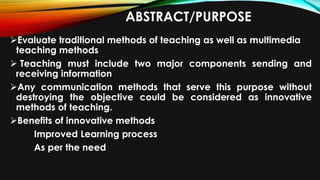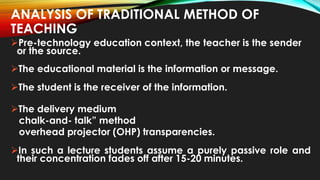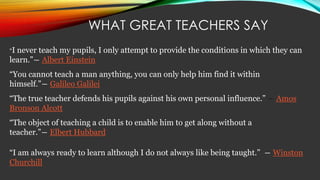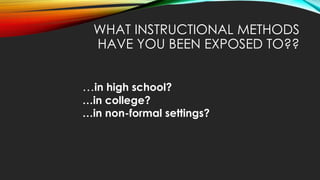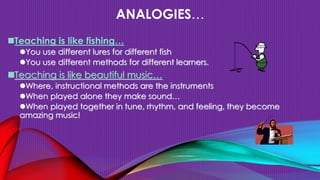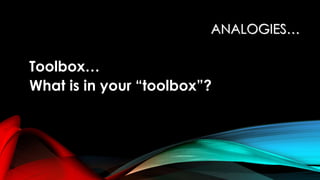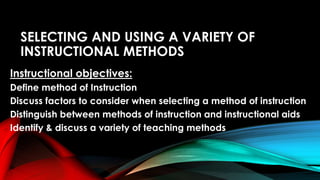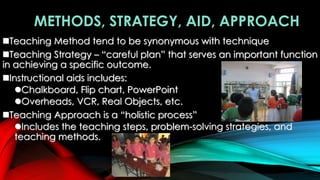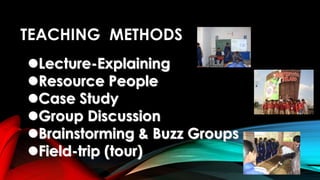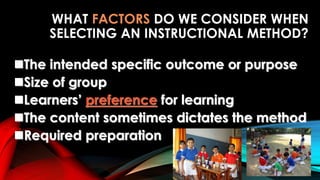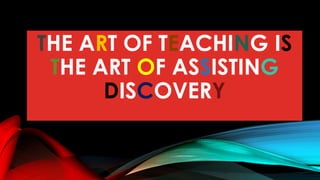My ppt on teaching
- 2. ABSTRACT/PURPOSE ïEvaluate traditional methods of teaching as well as multimedia teaching methods ï Teaching must include two major components sending and receiving information ïAny communication methods that serve this purpose without destroying the objective could be considered as innovative methods of teaching. ïBenefits of innovative methods Improved Learning process As per the need
- 3. ANALYSIS OF TRADITIONAL METHOD OF TEACHING ïPre-technology education context, the teacher is the sender or the source. ïThe educational material is the information or message. ïThe student is the receiver of the information. ïThe delivery medium chalk-and- talkâ method overhead projector (OHP) transparencies. ïIn such a lecture students assume a purely passive role and their concentration fades off after 15-20 minutes.
- 4. LIMITATIONS ïžTeaching in classroom using chalk and talk is âone way flowâ of information ïžTeachers often continuously talk for an hour without knowing students response and feedback. ïžThe material presented is only based on lecturer notes and textbooks. ïžThere is insufficient interaction with students in classroom. ïžMore emphasis has been given on theory without any practical and real life time situations. ïžLearning from memorization but not understanding
- 5. WHAT GREAT TEACHERS SAY âI never teach my pupils, I only attempt to provide the conditions in which they can learn.ââ Albert Einstein âThe object of teaching a child is to enable him to get along without a teacher.ââ Elbert Hubbard âYou cannot teach a man anything, you can only help him find it within himself.ââ Galileo Galilei âThe true teacher defends his pupils against his own personal influence.â â Amos Bronson Alcott âI am always ready to learn although I do not always like being taught.â â Winston Churchill
- 6. WHAT INSTRUCTIONAL METHODS HAVE YOU BEEN EXPOSED TO?? âĶin high school? âĶin college? âĶin non-formal settings?
- 7. ANALOGIESâĶ ïŪTeaching is like fishingâĶ ïŽYou use different lures for different fish ïŽYou use different methods for different learners. ïŪTeaching is like beautiful musicâĶ ïŽWhere, instructional methods are the instruments ïŽWhen played alone they make soundâĶ ïŽWhen played together in tune, rhythm, and feeling, they become amazing music!
- 8. ANALOGIESâĶ ToolboxâĶ What is in your âtoolboxâ?
- 9. SELECTING AND USING A VARIETY OF INSTRUCTIONAL METHODS Instructional objectives: Define method of Instruction Discuss factors to consider when selecting a method of instruction Distinguish between methods of instruction and instructional aids Identify & discuss a variety of teaching methods
- 10. METHODS, STRATEGY, AID, APPROACH ïŪTeaching Method tend to be synonymous with technique ïŪTeaching Strategy â âcareful planâ that serves an important function in achieving a specific outcome. ïŪInstructional aids includes: ïŽChalkboard, Flip chart, PowerPoint ïŽOverheads, VCR, Real Objects, etc. ïŪTeaching Approach is a âholistic processâ ïŽIncludes the teaching steps, problem-solving strategies, and teaching methods.
- 11. TEACHING METHODS ïŽLecture-Explaining ïŽResource People ïŽCase Study ïŽGroup Discussion ïŽBrainstorming & Buzz Groups ïŽField-trip (tour)
- 12. WHAT FACTORS DO WE CONSIDER WHEN SELECTING AN INSTRUCTIONAL METHOD? ïŪThe intended specific outcome or purpose ïŪSize of group ïŪLearnersâ preference for learning ïŪThe content sometimes dictates the method ïŪRequired preparation
- 13. THE ART OF TEACHING IS THE ART OF ASSISTING DISCOVERY


